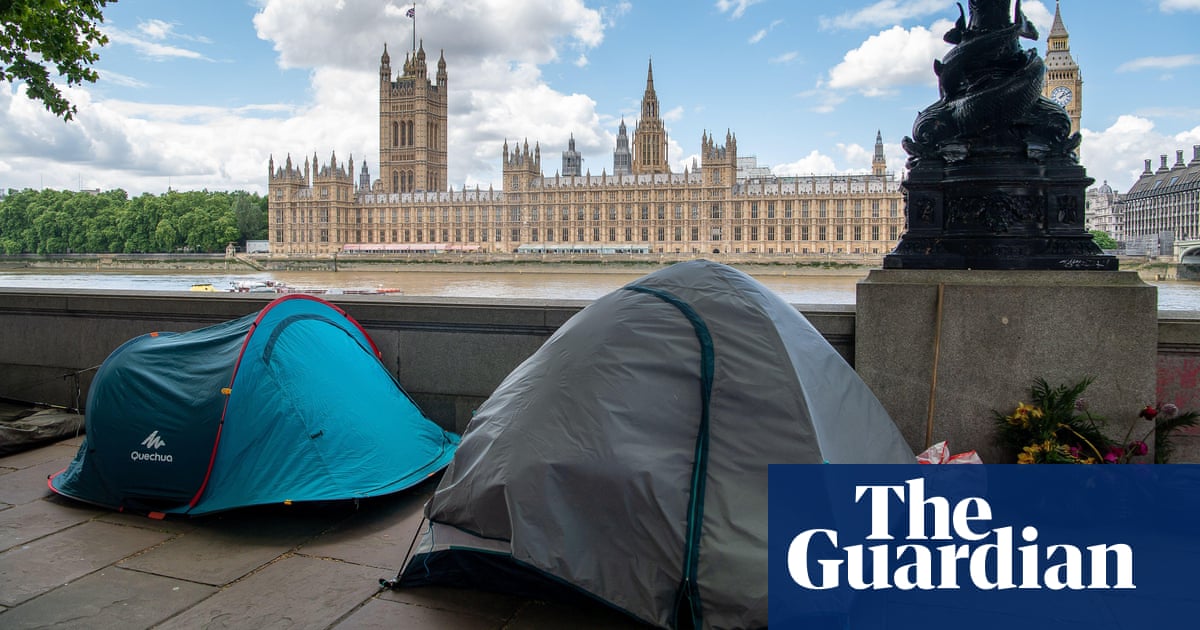
Sadiq Khan, the mayor of London, today sets the stage for a dramatic showdown with the home secretary, Priti Patel, over who should be the next Metropolitan police commissioner as he vows to oppose anyone who does not understand the deep “cultural problems” within the beleaguered force.
Writing in the Observer, three days after his intervention forced Cressida Dick to abruptly resign, Khan says recent revelations of officers bragging about violence towards women and exchanging racist and Islamophobic messages rekindled personal memories of the “bad old days of the Met” during his own childhood.
Khan says it was common when he was growing up on a south London council estate in the 1970s and 80s to hear “stories of racist, misogynistic and abusive conduct by police officers”.
He adds: “One of the things I remember being told as a teenager by my dad was: ‘Don’t make eye contact with the police, don’t give them an excuse.’ My brothers and I would routinely cross the road when we saw officers on the beat, simply due to the fear of being unjustly targeted.”
While it is the home secretary, Patel, who has the ultimate power to appoint the next commissioner, she can only do so having taken into account the preference of the mayor.
In his article, Khan makes absolutely clear that he will use his right to be involved in the process to ensure the appointment of someone who can guarantee an end to the Met’s toxic culture.
In effect, threatening to veto anyone whom he feels cannot rise to the huge challenge, Khan writes: “I will not support the appointment of a new commissioner unless they can clearly demonstrate that they understand the scale of the cultural problems within the Met and the urgency with which they must be addressed. In short, they need to get it, and they need to have a proper and robust plan to deal with it.”
His threat is likely to further provoke Patel, who is smarting after claiming that Khan did not inform her he was withdrawing support from Dick, a decision that forced her out.
The mayor’s mention of the need to avoid someone who lacks a “robust plan” appears to be a reference to Dick and her proposals to improve the Met, which were handed to Khan less than a week before she resigned.
He considered the proposals distinctly underwhelming, both because of the time they would have taken to deliver and because he thought they were insufficient to change the cultural mindset within elements of the force.
The appointment of the new commissioner is particularly fraught because the force is presiding over the most politically sensitive investigation it has ever undertaken, into a string of lockdown parties in Downing Street.
This weekend, No 10 confirmed that Boris Johnson had received a questionnaire to complete about his knowledge of and involvement in the gatherings. Many Tory MPs believe that if he is found to have broken lockdown rules and is issued with one or more fixed penalty notices it could spell the end of his premiership.
Opposition parties, fearing that Johnson might try to use the new commissioner’s appointment to delay or influence the Met’s report, last night stepped up demands that he remove himself entirely from the process.
Yvette Cooper, the shadow home secretary, said: “The police always need to operate without fear or favour and be seen to do so. That’s why no one who is subject to investigation by the police should be involved in appointing senior officers who have to take charge of those investigations – and that includes the prime minister. No one is above the law. For the sake of trust and transparency, he needs to recuse himself from any role in the appointment process for the Metropolitan police commissioner while the investigation into Downing Street is continuing.”
Sir Bob Neill, the Tory chair of the justice select committee, said Patel would need to have “very good reasons” to go against Khan’s choice for the next commissioner. “Politically, this could lead to a massive row. Unless she could produce a good reason to go against the mayor’s recommendation, it could even lead to a legal challenge.”
The relationship between Johnson and Patel will be scrutinised in the coming weeks with the home secretary’s political career having relied on his intervention when he kept her in post despite a report accusing her of breaking the ministerial code.
Relations between Khan and Patel are already tense with reports of disagreements over the size of Dick’s payoff and simmering tensions over the way the mayor forced London’s first female police commissioner out.
Whitehall sources, however, dismiss claims that Patel was blindsided by Khan, saying the home secretary’s officials were fully aware of the mayor’s concerns over Dick and also knew of last Thursday’s meeting which Khan arranged to discuss the commissioner’s future.
Sources are bemused at the Home Office’s briefings about Patel not being informed, and point out that it makes her look both “weak” and “out of the loop”.
One option being considered is the appointment of an interim commissioner while the search for a permanent chief is launched. Another solution might be to ask Dick to stay on for two months to steer the No 10 party inquiry over the line, a move that would prevent her replacement being contaminated by its findings.
Khan’s full support for the next commissioner is critical because of the intimate working relationship between the mayor and the leader of the force in the capital and the fact that Khan oversees the Met’s budget.
Meanwhile, Labour has urged Patel to instigate fundamental reform of the police to raise standards before the new chief is appointed. Cooper unveiled five key areas for reform, including the urgent inclusion of violence against women and girls in the Home Office’s strategic policing requirement, and the overhaul of training and misconduct proceedings.












